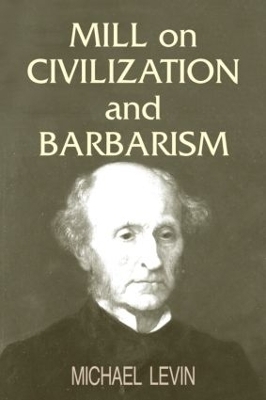
Mill on Civilization and Barbarism
Seiten
2004
Routledge (Verlag)
978-0-7146-8476-5 (ISBN)
Routledge (Verlag)
978-0-7146-8476-5 (ISBN)
This book investigates Mill's notion of the stages from barbarism to civilisation, his belief in imperialism as part of the civilising process and his discourses on the blessings, curses and dangers of modernisation.
John Stuart Mill's best-known work is On Liberty (1859). In it he declared that Western society was in danger of coming to a standstill. To understand how Mill came to this conclusion requires one to investigate his notion of the stages from barbarism to civilisation, and also his belief in imperialism as part of the civilising process. This study encompasses discourses on the blessings, curses and dangers of modernisation from approximately the time of the American and French revolutions to that of the so-called mid-Victorian calm in which On Liberty was written. Current political issues concerning the West and Islamic countries have heightened interest in just the kind of question that this book discusses: that of how the West relates to, and assesses, the rest of the world.
John Stuart Mill's best-known work is On Liberty (1859). In it he declared that Western society was in danger of coming to a standstill. To understand how Mill came to this conclusion requires one to investigate his notion of the stages from barbarism to civilisation, and also his belief in imperialism as part of the civilising process. This study encompasses discourses on the blessings, curses and dangers of modernisation from approximately the time of the American and French revolutions to that of the so-called mid-Victorian calm in which On Liberty was written. Current political issues concerning the West and Islamic countries have heightened interest in just the kind of question that this book discusses: that of how the West relates to, and assesses, the rest of the world.
Michael Levin is Senior Lecturer in Politics at Goldsmith's College, University of London. He previously taught at the Universities of Leicester, Leeds and Wales and has been twice Visiting Professor of Sociology at San Diego State University. He is the author of Marx, Engels and Liberal Democracy (1989), The Spectre of Democracy: The Rise of Modern Democracy as Seen by its Critics (1992), and The Conditions of England Question: Carlyle, Mill, Engels (1998).
Chronology 1. Introduction 2. Civilization 3. Barbarism and the Imperial Remedy 4. Progress 5. Civilization Threatened 6. Standstill: The Case of China 7. Aftermath
| Erscheint lt. Verlag | 10.6.2004 |
|---|---|
| Verlagsort | London |
| Sprache | englisch |
| Maße | 138 x 216 mm |
| Gewicht | 226 g |
| Themenwelt | Geisteswissenschaften ► Philosophie ► Geschichte der Philosophie |
| Geisteswissenschaften ► Philosophie ► Philosophie der Neuzeit | |
| Sozialwissenschaften ► Soziologie | |
| ISBN-10 | 0-7146-8476-7 / 0714684767 |
| ISBN-13 | 978-0-7146-8476-5 / 9780714684765 |
| Zustand | Neuware |
| Haben Sie eine Frage zum Produkt? |
Mehr entdecken
aus dem Bereich
aus dem Bereich
die kolonialen Wurzeln der französischen Theorie
Buch | Hardcover (2024)
Matthes & Seitz Berlin (Verlag)
28,00 €
eine Geschichte der Zuversicht von Homer bis zum Klimawandel
Buch | Hardcover (2024)
C.H.Beck (Verlag)
28,00 €


